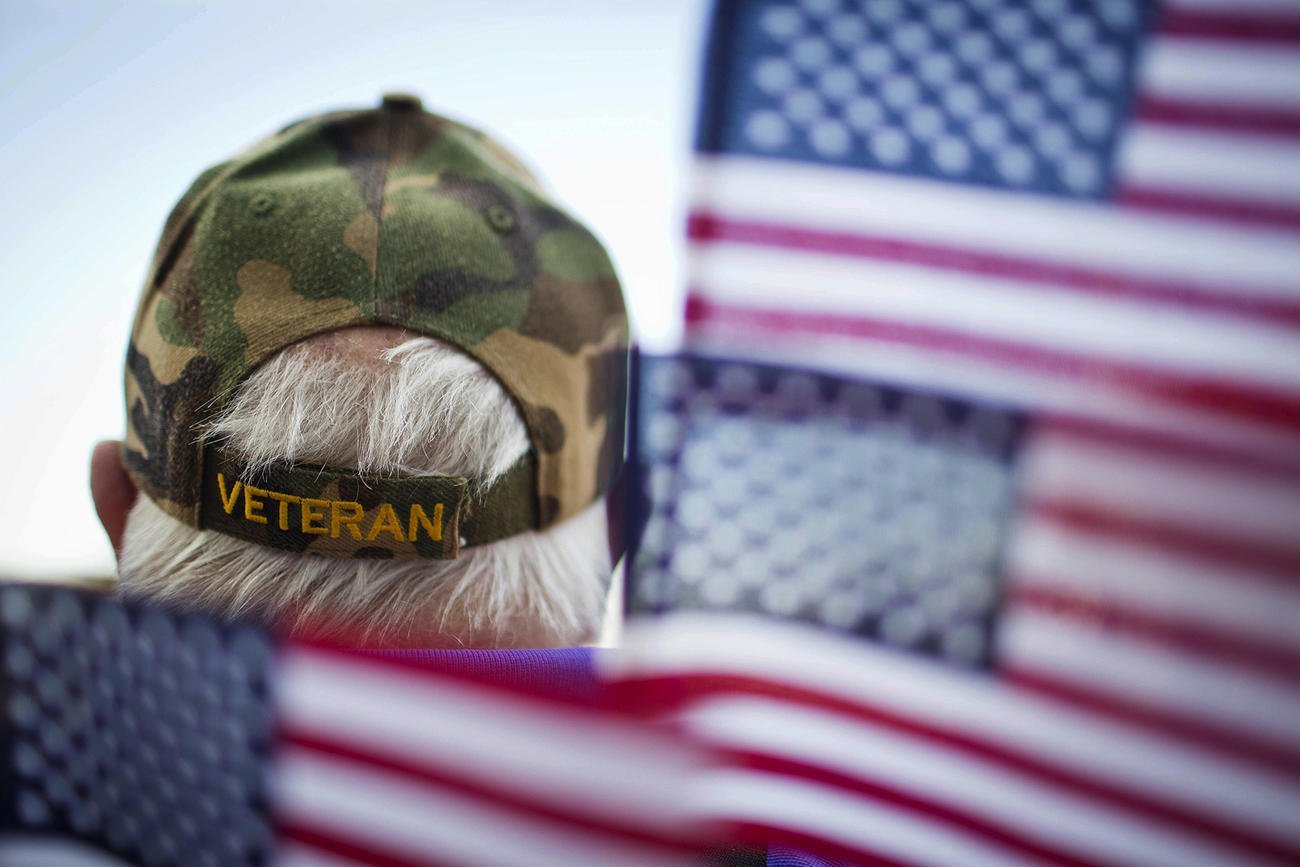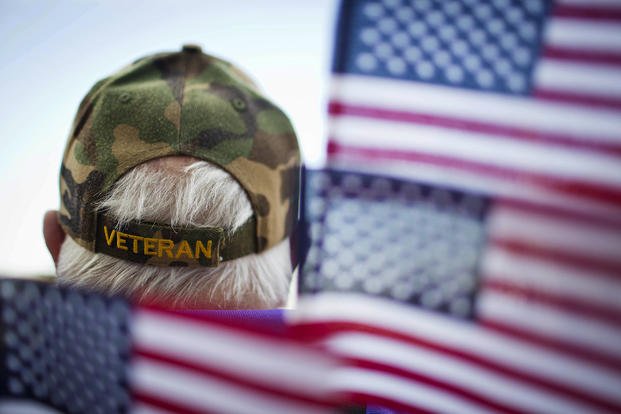

The Department of Veterans Affairs has established a new website and call center to help veterans who think they’ve been defrauded or charged exorbitant or illicit fees — former service members such as Navy veteran David Rouse, who recently learned he owes a company nearly $9,000 for helping with his disability claim.
A former boatswain’s mate and master of arms who served until 2015, Rouse has several service-connected conditions, including post-traumatic stress disorder, sleep apnea and musculoskeletal problems, and was awarded a disability rating of 80% a few years ago.
Recently, when his life circumstances changed, he decided to apply for a ratings increase and reached out to Trajector Medical, a company he found through a targeted advertisement that specializes in collecting medical information to support VA disability claims.
He got his upgrade within two months. But he also received an unexpected, massive bill from Trajector for $8,829.05. He said he had no idea he would be charged so much.
“I’m not saying I don’t want to pay; I’ll pay a percentage. But nearly three times my back pay? That’s highway robbery,” Rouse said in an interview with Military.com
The VA announced earlier this month that its fraud prevention and complaint program, called VSAFE, has a new website and hotline, 1-833-388-7233, for veterans and family members to learn about fraud schemes and report potential scams.
The VSAFE, or Veterans, Servicemembers and Families Fraud Evasion, program actually was established last year with the White House’s Interagency Policy Council to determine how to protect veterans against fraud. The improved website and call center are the fruits of that effort, with added resources from a litany of federal agencies, including the Defense Department, Internal Revenue Service, Social Security Administration and Federal Trade Commission.
Fraud and predatory practices have become a major concern at the VA following passage of the PACT Act, the law that expanded health care and benefits to millions of veterans exposed to environmental hazards while serving in certain areas. According to the VA, the promise of disability benefits to so many beneficiaries may make veterans and families “targets for bad actors.”
“We know that more veterans than ever before are now receiving VA benefits, which sadly means that more bad actors are trying to steal those benefits. That’s why we’re launching these tools: to give these heroes every tool at the federal government’s disposal to protect themselves and their families,” VA Secretary Denis McDonough said Aug. 9 in a statement.
By law, companies are barred from charging veterans any fees for filing initial disability claims and are not allowed to assist veterans with any claims unless they are accredited by the VA Office of General Counsel.
The VA recommends that veterans who need assistance seek it from an accredited veterans service organization, a state or local veterans services officer, or approved claims agent.
Since passage of the PACT Act, the number of for-profit companies that charge for those services has increased exponentially with no limits on the amount of fees they charge.
The companies say that, with the VA’s number of disability claims as well as its backlog — nearly 1 million pending claims with one-quarter of those older than 125 days as of this month, they provide options for those who don’t understand the system or have the energy to fight for approval.
They have formed a government advocacy group, the National Association for Veteran Rights, to promote the industry and support legislation that allows companies to provide services.
The association is led by Peter O’Rourke, former acting VA secretary and VA chief of staff under the Trump administration.
“We can do better. This trade association advocates for ethical and transparent business practices for companies that support our veterans,” O’Rourke says in a video on the group’s website.
Veterans advocates argue that the companies’ practices are predatory and illegal, given that no unaccredited companies are permitted to help veterans with claims.
“This scourge took on a whole new life during COVID-19 and really preyed on veterans, survivors and military caregivers who didn’t know where to turn for benefits help,” Ryan Gallucci, executive director of the VFW’s Washington office, said during a press conference in Washington, D.C., last November.
“The bottom line is this: Predatory claim-shark companies are engaging in illegal activities,” said VFW National Commander Duane Sarmiento during the same press conference. “There is no gray area here, no matter how much money they want to throw at it. Their latest collusion is a desperate attempt to avoid accountability.”
Until 2006, unaccredited individuals or companies who charged fees for VA claims assistance were subject to penalties and fines. Without those penalties, however, the VA can only send “cease and desist” letters to companies and must work with local, state and other federal law enforcement agencies to prosecute those that break the law. According to the VA, it has sent more than 40 such letters this fiscal year, up from 18 sent in fiscal 2023 to unaccredited companies and individuals.
The VA has asked Congress to reinstate criminal penalties against companies that file illegal claims, but while it waits for that authority, it established VSAFE to educate veterans on the process and potential scams.
“We urge you to be cautious against selecting a representative and ensure they are accredited by VA. There are currently more than 14,000 accredited individuals in the VA system,” David Barrans, chief counsel for benefits law in the VA’s Office of General Counsel, said during a press conference last September.
The department also has launched an awareness campaign within the Veterans Benefits Administration to educate employees on these companies, which the VA calls “claims predators” as opposed to “claim sharks,” the term preferred by accredited veterans service organizations.
“Aggressive communication via emails, phone calls, and/or text messages is used in an effort to get veterans to sign legally binding contracts that are not to the veteran’s advantage. They advertise expedited claim processing times and/or guarantee higher disability ratings in exchange for their paid services. These fraudulent schemes target veterans’ hard-earned benefits and may subject them to excessive fees,” according to an internal email obtained by Military.com.
Rouse, the veteran who owes Trajector more than $8,000, said he can’t find a copy of his contract but has asked for one. He doesn’t recall what it said but, according to Steven Zenofsky, Trajector Medical’s communications director, the company charges five times the amount of the monthly increase in their VA pay.
Zenofsky said the fees are outlined in a service agreement presented to the veteran before they sign, and the company doesn’t charge advanced fees.
“The number of satisfied Trajector Medical clients is steadily rising, as evidenced by the increasing number of online testimonials from veterans. This growth in client satisfaction is a testament to ensuring our clients are well-informed at every stage of our service,” Zenofsky said in an email to Military.com.
Rouse said he first went to two different accredited veterans service organizations for help. One said they would help get a 100% disability rating along with individual unemployability, which meant he would not be able to hold a job and collect disability. The other, he said, didn’t seem interested because he was not a member of a local chapter.
So, he turned to Trajector, which he said helped make the needed medical appointments but didn’t seem to do much else.
“I did all the legwork, and they felt like they played some major role. I told them they should be ashamed of themselves for what they’re doing,” Rouse said.
He added that companies such as Trajector provide a needed service, but there should be a cap on the amount they can charge.
Attorneys assisting with Social Security claims, for example, can charge up to 25% of benefits backdated to the claims filing or $7,200, whichever is less, with some exceptions. The cap is expected to rise to $9,200 in November.
“If they were really trying to help, they wouldn’t be asking for so much money,” Rouse said.
Rep. Chris Pappas, D-N.H., and Sen. John Boozman, R-Ark., introduced legislation last year in their chambers that would impose penalties on individuals or companies that solicit, contract and charge “unauthorized” fees for preparing or filing VA benefits.
The Governing Unaccredited Representatives Defrauding, or GUARD, VA Benefits Act has 258 additional sponsors in the House and Senate but has not passed through committee, meaning it likely won’t be considered this year.
“The [VA] must exercise every enforcement tool at its disposal and request those it needs to better protect veterans from bad actors looking to take advantage of them,” Pappas and Boozman wrote in a letter to McDonough about the bill in September.
Another bill, the PLUS, or Preserving Lawful Utilization of Services, for Veterans Act, sponsored by Rep. Jack Bergman, R-Mich., in the House and Sen. John Kennedy, R-La., in the Senate, would change the accreditation process so the companies can legally continue their operations. It also would impose criminal penalties on businesses that remain unaccredited.
